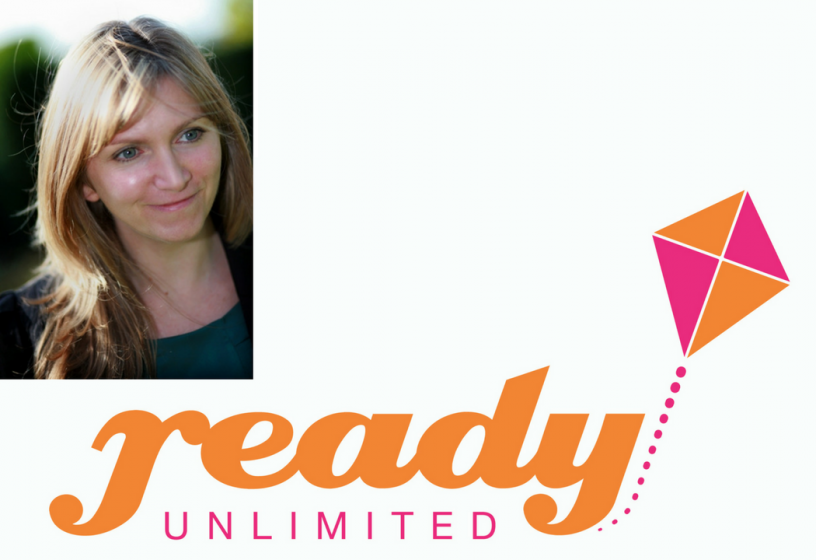In the spotlight:
Name: Catherine Brentnall
Location: Derbyshire.
Occupation: MD, Ready Unlimited; PhD Candidate at Sheffield Hallam University
What does ‘enterprise education’ mean to you, and why do you think it’s important?
A lot of my work over the last twelve years has involved working with teachers and trainees in primary and secondary education (in schools, colleges and universities) to develop enterprise through the curriculum. People have different ideas about what enterprise education is, so we explore definitions such as the one from the Davies Review which has three strands – enterprise capability, financial capability and economic and business understanding. It’s always interesting to see which learning outcomes from each strand educators recognise in their practice, and which could be developed. What enterprise education has meant to me personally over the years has deepened as I’ve taken to thinking and writing about it from a more theoretical perspective. Enterprise education is important not least because there are many government policies telling educators to become involved in it. I’m personally interested in equipping teachers with the knowledge to engage with and critique policy, and develop their own responses to enterprise education which align with their values and the needs of their students and communities.
How did you first become involved with enterprise education?
In 2006, I started working on a school improvement programme called Rotherham Ready, which aimed to harness enterprise as a vehicle to enhance learning and teaching. One of my responsibilities was working with teachers to design and deliver professional learning. Over time we scaled our approaches outside the borough and, in 2013, I secured investment from NESTA. This supported the spin out of a social business, Ready Unlimited, which is focused on developing teachers to enhance the curriculum with careers and enterprise learning. I was so lucky in Rotherham Ready to have a wonderful manager, Jackie Frost, who supported me to do a Masters Degree and never put a limit on what we could achieve. A high point was winning ‘The Most Enterprising Place in Britain’ in 2011 for our work developing enterprise in education and supporting youth start-ups.
Can enterprise be included at all stages of education, and within every subject? If yes, how? If no, why not?
I work with educators at every stage of education – early years, primary, secondary and HE. It’s never a blank slate though; people are always doing plenty of things that would be considered ‘enterprising’, so it’s more a case of understanding how learning could be deepened and how enterprise approaches could inspire students to produce better quality. Last year I worked on an EEUK funded project to look at practices which teachers could explore and use to develop careers and enterprise through the curriculum. Though the project focused on the secondary school context, the practices are transferable to any stage. There’s a draft guide and benchmarking tool which I’d encourage people to take a look at and give me feedback on, if they’ve got the time and interest to do so.
Ready Unlimited – which you founded – supports educators in developing an enterprising and entrepreneurial culture, curricula and pedagogy. Tell us more about the services on offer and how they contribute to a student’s development?
I work with a range of clients including individual schools, partnerships of schools, teacher educators, organisations including colleges and universities, regional and national governments at home and abroad, and organisations including the EU and the OECD. I provide anything from 1-2-1 or small group coaching with teachers, to professional development programmes for a specific organisation or territory, as well as consultancy and research. Focusing on educators and on curriculum design means that more young people are potentially impacted. But there’s responsibility that comes with that – students aren’t volunteering in, they don’t have a choice about the curriculum, so there’s a need to be cautious and ensure approaches are sound and don’t do more harm than good.
In October, I started a PhD at Sheffield Business School (SBS), part of Sheffield Hallam University, and am researching competitive enterprise education. I’m fascinated how competitive approaches are handed down to enterprise educators as a go-to activity (they were handed down to me, and initially, I handed them on uncritically). As a side project I’ve been exploring the potential theoretical flaws of such approaches, and now SBS have supported me with a scholarship to do some original research, which I hope will throw a bit more light on the effects of competitive learning, and that practitioners and students will benefit from a contribution to knowledge in this area.
In a sector where results and rankings seem to dominate, how do educators evaluate and measure the success of enterprise education?
In the last couple of years I have become really interested in Realist Evaluation and how it helps me think about the evaluation of enterprise education interventions. Realist Evaluation has been developed by researchers in the field of Evidence Based Medicine (EBM), who have become frustrated with the partial knowledge and unanswered questions which persist when only Randomised Control Trials (RCT) and systematic analysis are utilised to evaluate the effects of complex programmes. Instead of trying to judge ‘what works’, the approach tries to better understand ‘what works, for whom, in what circumstances and why?’ (Pawson & Tilley are two key authors who have developed the approach). During my time in enterprise education I’ve been evaluated, commissioned evaluations, written evaluations and researched evaluation. Realist Evaluation makes me look back on these experiences in a new light and think about what else I would have learned if I’d taken a Realist approach. I hope that the field of education – which can appear sucked into the philosophy that RCTs are the ‘rigorous’ approach in evaluation – utilises the potential for the rigour and meaning which is offered through Realist Evaluation.
What would you say to any institutions or individuals who have still not included enterprise education within their curriculum, or who are sceptical about the benefits of an entrepreneurial approach?
First, I’ve no problem with people being sceptical. Indeed, one of the practices in the benchmarking tool I mentioned in question three is taking the time to consider and critique what you’re being asked to do. It’s a crucial step in professional development and learning, and can be encouraged by asking questions, surfacing concerns and identifying any dissonance between your ambitions for learners and what you’re being told to do. Second, from a Realist Evaluation perspective, one cannot assume that enterprise education will always have benefits for every participant, so it’s really healthy to think through potential unintended consequences and carefully design learning and activities that are most likely to achieve the aims that are hoped for.
Where do you hope to see enterprise education in five years’ time?
I think enterprise education is a vibrant field full of committed people, and I hope there is continued debate, research and challenge which moves it forward.
What does a typical day look like in the world of Catherine Brentnall?
No such thing as a typical day! The last year or so has involved such a variety of work. It’s included working with Social Enterprise International on a Horizon 2020 project called Nemesis which is about developing social innovation in education; working with The Enterprise Team at Huddersfield University; innovating and evaluating an Enterprise Placement Year programme; as well as working with teachers from across my home region on a Derbyshire Ready programme I run in partnership with the county council. Since starting a PhD at Sheffield Business School, I’ve had the privilege of being a student again and reading, writing and thinking about something which I find fascinating – enterprise education.
And finally, Catherine, tell us: if you were an animal, what would you be and why?
At the moment, I feel like I’d be Road Runner, chasing about narrowly avoiding an accident (I’m a one-woman band, so everything is always really busy). Given a choice, I’d like the odd day as Bagpuss, chilling out and letting a team of mice fix things for me (wishful thinking).





Leave a Reply